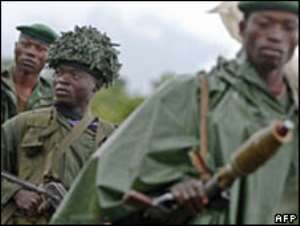
The UN is to send a convoy of food and medical supplies to help the 250,000 people displaced by recent fighting in the Democratic Republic of Congo.
It will be the first aid in a week for those stranded in areas controlled by renegade Gen Laurent Nkunda's forces.
Visiting the region, the UK and French foreign ministers said urgent action was needed to ease the ongoing crisis.
David Miliband and Bernard Kouchner said both the implementation of peace deals and the delivery of aid were key.
Some 250,000 people have been forced from their homes in two months of conflict in eastern DR Congo, and aid agencies have been forced to suspend operations in many areas.
See a detailed map of the area
Gen Nkunda's forces last week routed the Congolese military in areas around Goma, the capital of the restive North Kivu province.
A fragile ceasefire is now in place, and Gen Nkunda has said he would guarantee "humanitarian corridors" for the convoy through rebel lines.
Supplies, water, sanitation
While as many as 50,000 displaced reached Goma, many others have tried to return to their homes on foot through rebel-held territory. It is unclear how they are managing to survive.
The recent rebel offensive - exacerbated by a spate of killing, looting and raping by retreating Congolese soldiers - has created what aid agencies have termed a "humanitarian catastrophe".
Many displaced Congolese have been reduced to foraging for wild roots and berries in the bush, without safe shelter, water and care.
The aid convoy - which had initially been scheduled to leave on Sunday - will include staff and resources from UN agencies and humanitarian NGOs, and will be escorted by UN troops.
It will visit places such Rutshuru - 90km (55 miles) north of Goma - where the UN said camps sheltering 50,000 refugees were last week forcibly emptied, looted and razed.
"Our priority is to restart the activities at many health centres in the area," said Gloria Fernandez, head of the UN's Office for the Co-ordination of Humanitarian Affairs (OCHA) in Goma.
"We're taking health supplies, water, and sanitation."
Aid corridor
In a weekend of shuttle diplomacy, the European foreign ministers met both Rwandan President Paul Kagame in Kigali and Congolese President Joseph Kabila in Kinshasa.
They said bilateral peace agreements already in place between regional powers must be honoured.
The Congolese government accuses Rwanda of backing the rebels, but both countries' presidents have agreed to attend a regional summit on the situation in the coming weeks.
After visiting camps for displaced people around Goma, Mr Miliband and Mr Kouchner said establishing an aid corridor to Goma was a top priority.
"The humanitarian needs for food, shelter, water and healthcare must be met through universal provision and secure routes for delivery," they said.
They also called for the strengthening of the 17,000-strong UN force in DR Congo (Monuc), but appeared to rule out sending EU forces.
Meanwhile, a leading aid agency called on European ministers meeting in Marseille later to back the sending of EU troops to support Monuc - a proposal that has US support.
"The European Union is well placed to rapidly provide the additional troops that the people of Congo desperately need," said Juliette Prodhan, head of Oxfam in DR Congo.
"Given the fragility of the ceasefire and fears for another outbreak of intense fighting around Goma, more troops must be deployed as soon as possible."
Army collusion?
UK Prime Minister Gordon Brown has said the international community must "not allow Congo to become another Rwanda".
In 1994, 800,000 people died in Rwanda's genocide that is seen as the origin of the current conflict across the border.
Gen Nkunda says he is fighting to protect his Tutsi community from attack by Rwandan Hutu rebels, some of whom are accused of taking part in the genocide.
There have been accusations of collusion between DR Congo's army and Hutu guerrillas.
The Congolese government, for its part, has accused Rwanda of backing Gen Nkunda.
Rwanda denies this, but it has twice invaded its much larger neighbour in recent years.




 Aggrieved butchers reject increment of slaughter fees, threaten street protest ...
Aggrieved butchers reject increment of slaughter fees, threaten street protest ...
 Naa Ayemoede returns to school
Naa Ayemoede returns to school
 Arrest “notorious” land guards terrorising land owners – Samuel Ayeh-Paye to Pol...
Arrest “notorious” land guards terrorising land owners – Samuel Ayeh-Paye to Pol...
 Dadieso residents block Accra-Kumasi highway
Dadieso residents block Accra-Kumasi highway
 Kasoa soldier killer remanded
Kasoa soldier killer remanded
 Rashid Pelpuo slams Opoku Prempeh for denying dumsor
Rashid Pelpuo slams Opoku Prempeh for denying dumsor
 Bawumia lacks new ideas, stealing from Mahama — Joyce Bawa alleges
Bawumia lacks new ideas, stealing from Mahama — Joyce Bawa alleges
 I will foster a strong partnership between gov’t and media to protect our natura...
I will foster a strong partnership between gov’t and media to protect our natura...
 Societe Generale to exit Ghana, other African countries
Societe Generale to exit Ghana, other African countries
 May 4: Cedi sells at GHS13.99 to $1, GHS13.42 on BoG interbank
May 4: Cedi sells at GHS13.99 to $1, GHS13.42 on BoG interbank
